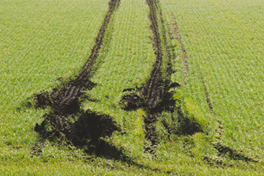 Soil compaction is a form of soil degradation frequently caused by the use of heavy machinery under unfavourable (i.e. wet) soil conditions.
Photo: RECARE
Soil compaction is a form of soil degradation frequently caused by the use of heavy machinery under unfavourable (i.e. wet) soil conditions.
Photo: RECARE
Affected by climate change and increasing human intervention, soils are under growing threat from a wide range of processes such as soil erosion, compaction, desertification, sealing, and contamination. Soils perform important functions and services, including food production, buffering and filtering of water, nutrient and carbon storage, and others. Soils need to be adequately protected and conserved to ensure that these functions and services remain available. The RECARE project has brought together a multidisciplinary team from 27 organizations to assess current threats to soils and develop innovative solutions to prevent further soil degradation across Europe.